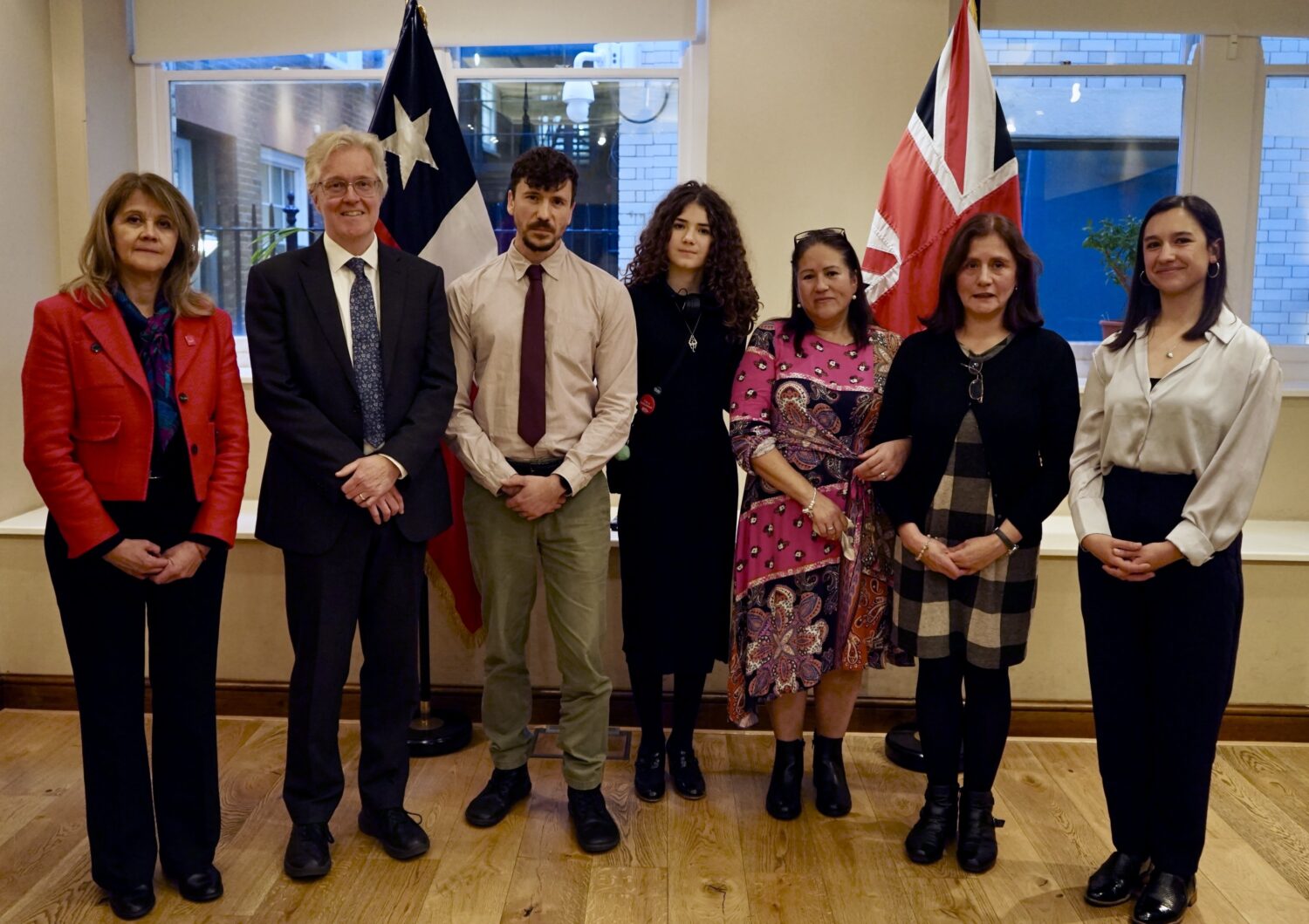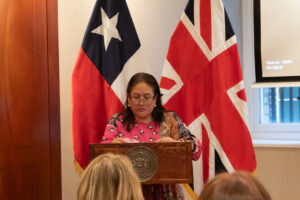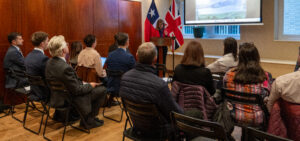
Historic Recognition: Chile Apologises to Family of Torture Victim, 50 Years After Being Exiled, for Their Suffering and Denial of Justice
Chilean State reaffirms its commitment to adopt, for future cases, clear and transparent guidelines for extradition proceedings related to international crimes
Today, the Chilean government offered a public apology to the family of the late Leopoldo García Lucero, a survivor of torture under the Pinochet regime, who, along with his family, was forcibly exiled to the United Kingdom 50 years ago.
The ceremony, who took place at Chile’s Embassy in London, acknowledged the profound impact of Leopoldo’s torture on him and his family, and the further harm caused by the Chilean State’s prolonged delays in investigating and prosecuting the main suspect in his torture. The suspect died in the United States in 2022 without ever being extradited to Chile, ultimately making a criminal conviction impossible.
Commitment to the principles of truth, justice and reparation
During the ceremony, Daniela Quintanilla, Undersecretary for Human Rights, offered a public apologise to the memory of Leopoldo reaffirmed the Chilean State’s commitment “to ensuring that extradition procedures for international crimes, such as crimes against humanity or war crimes, are processed quickly, transparently, and with clear institutional responsibilities, ensuring that bureaucracy or political circumstances do not hinder access to justice.”
Leopoldo, an Allende supporter and survivor of the National Stadium in Santiago, made history in 2013 when his case became the first involving a living survivor of human rights violations under General Augusto Pinochet’s dictatorship to be decided by the Inter-American Court of Human Rights, the highest human rights court in the Americas. After being forcibly expelled from Chile in 1975 by the military dictatorship, Leopoldo lived in exile in London, with his wife and three daughters, until his death in 2021. The injuries he sustained from torture left him permanently disabled.
The Chilean State was represented at the event by Quintanilla and the Ambassador of Chile to the United Kingdom, Ximena Fuentes. The ceremony was also attended by surviving members of Leopoldo’s family residing in the UK, including two of his daughters.
According to the Chilean Ambassador Ximena Fuentes, the ceremony was aimed at reaffirming the Chilean State’s commitment to the principles of truth, justice and reparation.
“By gathering here at the Embassy, we honour not only Don Leopoldo’s memory but also acknowledge the deep and lasting pain endured by those who loved him most. His wife and daughters carried the weight of his suffering in their own lives. The State of Chile recognizes that the scars of political violence affect not only the direct victim, but also their family across generations. May this act serve as a reaffirmation of the Chilean State’s commitment to truth, justice, and reparation.”
Words from the family of Leopoldo García Lucero
Francisca García, one of Leopoldo’s daughters, read a statement at the ceremony. Additional statements from his widow, Elena Otilia García, and their daughter, María Elena Klug, were read on their behalf, as they were unable to attend due to poor health. All the statements highlighted the profound impact that Leopoldo’s torture and the family’s forced exile had on their lives, including the loss of career plans and relationships, experiences of racism and discrimination in the UK, struggles with mental health, and even episodes of homelessness.

Francisca García, one of Leopoldo’s daughters, reading a statement at the ceremony.
Francisca García referred to the “chaos” caused by the family’s circumstances, and said:
“I was looking for stability; a normal life that seemed so out of reach. However, the feelings I had and the way I viewed the world were fundamentally altered by my experiences.”
“In moments of desperation, I even resorted to running away, believing that leaving would somehow offer me the respite I so desperately craved. It has been a long and painful journey, and the scars of my past are not easily healed.”
Excerpts from the statement made by Leopoldo’s widow, Elena Otilia García, who will turn 95 in November, to the Inter-American Court of Human Rights, describing the deep and lasting pain endured by the family, were read on her behalf. Some of these excerpts are reproduced below:
“On arrival in England our lives changed completely because we lost our world: our parents, brothers and sisters, and the rest of our family and friends remained in Chile, the place where we lived, where we worked, and where we left our dreams.”
“From one day to the next we had to fight to survive in a world that is not ours. On arriving in the United Kingdom we were victims of discrimination in social housing where they gave us lodging. They put bags of rubbish outside our door and they threw things at our window.”
“It was not just Leopoldo who was detained, tortured, and expelled from the country. What they did to him, and what continues to have a terrible effect on my life and on the lives of my daughters, is that Chile has not recognised us as victims.”
“When democracy returned to Chile, the Chilean Government should have put those who tortured Leopoldo in jail. I do not understand why justice has been so delayed.”
In her statement, María Elena Klug, another of Leopoldo’s daughters, said:
“[Torture] doesn’t stop with the person who was tortured, it affects everybody although in a different way; we are all victims of injustices and the violation of Leo’s human rights, and all of this has had a big impact in our lives. The family wears psychological scars and we are all casualties of these injustices. Sadly, this kind of insight and these kinds of impacts often don’t get taken into account. It is important that the perpetrators of these human rights violations know that their actions didn’t just impact Leo, but all of us, the next generation and the one after that.”
Chris Esdaile, Senior Legal Advisor at REDRESS, a human rights organisation which represented Leopoldo before the Inter-American Court of Human Rights, initiating the case on his behalf in 2002, said:
“Leopoldo did not live to see full justice delivered in his case, and his family have been deeply impacted both by the failure to convict anyone of the torture which he suffered, and also by the inter-generational effects of Leopoldo’s treatment.”
The Chilean Ambassador to the United Kingdom, Ximena Fuentes, reaffirmed the Chilean State’s commitment to the principles of truth, justice and reparation.
Background of the case
In 2013, the Inter-American Court ordered Chile to provide Leopoldo García Lucero with reparations, including: £20,000 in compensation for moral damages, funding for medical treatment related to the torture he endured, and a public apology. It also ordered Chile to open a criminal investigation “within a reasonable time.”
On 7 March 2014, Leopoldo received a formal apology at the Chilean Embassy in London for the torture that he suffered. On 9 November 2017, the Chilean Supreme Court formally requested the extradition of one of the alleged perpetrators, Carlos Humberto Minoletti Arriagada, from the United States so that he could be tried for crimes against humanity.
However, Leopoldo died on 18 August 2021 at the age of 87 without ever seeing anyone held accountable for his torture. The extradition of Minoletti, who remained the focus of the investigation, was not completed before his own death in the United States on 8 April 2022.
Leopoldo was recognised as victim of torture number 9,581 by the Valech Commission in November 2004. It is estimated that around 200,000 Chileans were forced into exile and over 38,000 survived torture under the Pinochet dictatorship (1973-1990).
Since 2023, the Museum of Memory and Human Rights (Museo de la Memoria y los Derechos Humanos) in Santiago de Chile has included a permanent archive dedicated to his case.
REDRESS, an international human rights organisation based in London that seeks justice and reparation for survivors of torture, represented Leopoldo before the Inter-American Court of Human Rights, initiating the case on his behalf in 2002.
Read more about the case here.
For more information or to arrange interviews (in English or Spanish), please contact: Eva Sanchis, REDRESS Head of Communications, on [email protected] or +44 (0) 7857 110076.
Photo by REDRESS: From left to right, the Ambassador of Chile to the United Kingdom, Ximena Fuentes; Chris Esdaile, Senior Legal Advisor at REDRESS; Jake Illanes (grandson of Leopoldo García); Eilena Illanes (great-granddaughter of Leopoldo García); Francisca García (daughter of Leopoldo García); Gloria Blaskett (daughter of Leopoldo García); and Daniela Quintanilla (Undersecretary of Human Rights of Chile).


